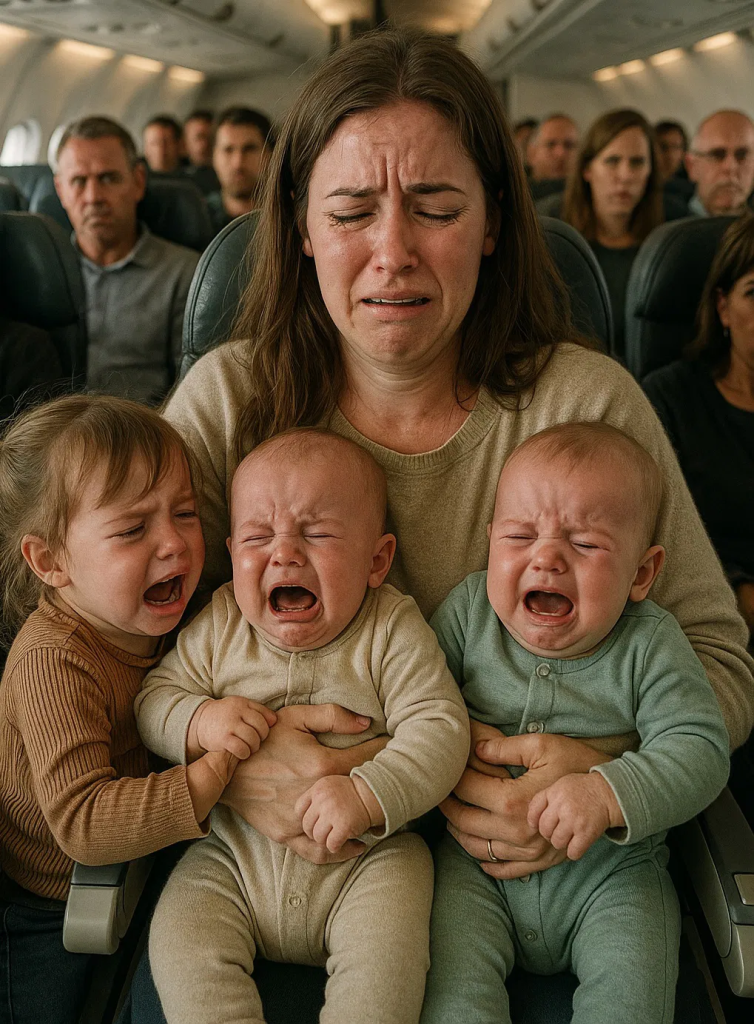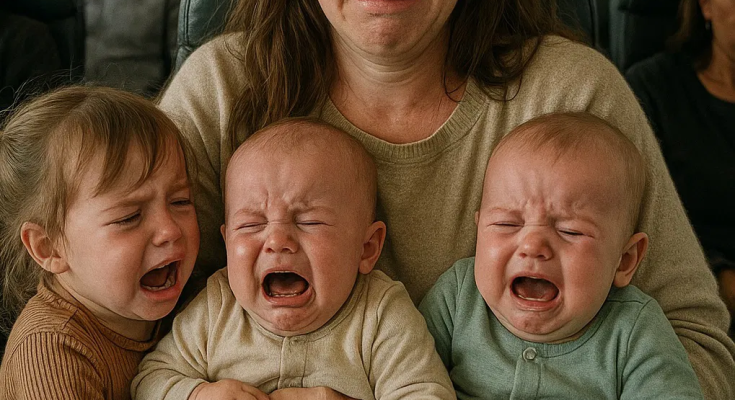The first time I traveled alone with all three of my babies, I thought I was prepared. Diaper bags packed, bottles pre-filled, toys tucked neatly in the carry-on, and snacks for emergencies. I told myself it would be manageable. After all, I was their mother. Who else could do this if not me?
But nothing prepared me for what happened at 30,000 feet.
My husband and I had boarded the plane together with our three little ones—Emma, just two years old, and our twins, Noah and Grace, barely six months. From the start, things felt overwhelming. Emma was restless, wriggling in her seat and kicking the tray table. The twins were already fussing, their cries echoing in the cramped space.
And then, just minutes after takeoff, my husband leaned over and whispered, “I’m going to switch seats with someone. It’ll give me a little break.”

Before I could protest, he had already moved down the aisle to an empty seat several rows away. I sat there frozen, three small children pressing in on every side, the weight of it all sinking onto my shoulders.
At first, I tried to stay calm. I bounced Noah on one knee while cradling Grace against my chest. Emma tugged at my sleeve, demanding attention, her tiny voice loud and insistent. Then, as if on cue, all three of them erupted into cries at the same time.
It was a storm of sound—sharp, relentless wails that filled the cabin. Heads turned. I could feel eyes boring into me from every direction. Some passengers frowned, others sighed loudly, a few shifted uncomfortably in their seats. No one said a word, but I felt the weight of their judgment.
My arms trembled as I tried to hold two babies at once, fumbling to steady a bottle while Emma pulled at my shirt. My heart raced, my cheeks burned. The harder I tried to soothe them, the louder they seemed to cry.
For a moment, I wished I could vanish, melt right into the seat cushion and disappear from the stares and the whispers.
Then, something unexpected happened.
The cockpit door opened.
Out stepped the pilot, tall and calm in his crisp uniform. His very presence seemed to hush the cabin. He scanned the aisle, then walked steadily toward me. My breath caught as he stopped beside my row.
“Ma’am,” he said gently, his voice low and steady, “may I help you?”
I blinked, unsure if I had heard him correctly. “You… you want to help?”
He gave a kind smile, one that held no trace of judgment. “If you’ll let me.”

Before I could overthink it, he reached out and carefully lifted Noah into his arms. His practiced hands steadied the baby with such confidence, it was as though he had done this a hundred times before. He cradled Noah against his shoulder, rocking him gently, and then took the bottle from my trembling fingers.
Within minutes, Noah’s cries softened to hiccups, then quieted altogether as he suckled peacefully.
The change was almost magical. Grace, hearing her brother calm down, eased into my chest with softer whimpers. Emma, momentarily distracted by the sight of the uniformed pilot holding her baby brother, stopped tugging at me and watched in wide-eyed wonder.
And slowly, like a storm breaking apart, the chaos subsided.
The cabin, once filled with sharp cries and restless passengers, grew quiet. The tension dissolved into something softer. A few people even smiled as they watched the scene unfold.
I felt tears prick my eyes. Relief, gratitude, and sheer exhaustion collided all at once. “Thank you,” I whispered, my voice shaking. “Thank you so much.”
He simply nodded, as if it were the most natural thing in the world.
For the next fifteen minutes, he stayed beside me. He rocked Noah, steadied the bottle, and spoke softly about how his own children were grown now, but he still remembered those early days of sleepless nights and endless cries. His words were like balm to my frayed nerves.
Finally, when all three babies were quiet, he carefully placed Noah back in my arms. “You’ve got this,” he said warmly. “You’re stronger than you think.”
I couldn’t speak. My throat was too tight, my heart too full.

Before returning to the cockpit, he gave me one last reassuring smile. Then he slipped away as quietly as he had appeared.
Later, when the plane landed and passengers began to shuffle out, a woman tapped me on the shoulder. “That was one of the kindest things I’ve ever seen,” she whispered. “Don’t forget, you’re doing a wonderful job.”
I nearly broke into tears again.
When I saw the pilot near the gate after the flight, I rushed to thank him once more. “You didn’t have to do that,” I said, still overwhelmed.
He shook his head with a modest smile. “It wasn’t heroic. It was simply the right thing to do.”
But to me, in that moment, it had felt like a miracle.
At 30,000 feet, with three crying babies, abandoned by the one person I thought would stand by me, a stranger’s kindness lifted me from despair. His small act reminded me that compassion still exists in this world, often where we least expect it.
And as I walked out of that airport, carrying my babies in my arms, I carried something else too: the unshakable memory of a man in a pilot’s uniform who looked at me not with judgment, but with kindness—and chose to help.
Note: This piece is inspired by stories from the everyday lives of our readers and written by a professional writer. Any resemblance to actual names or locations is purely coincidental. All images are for illustration purposes only.



